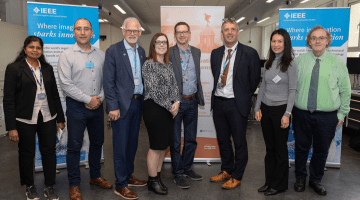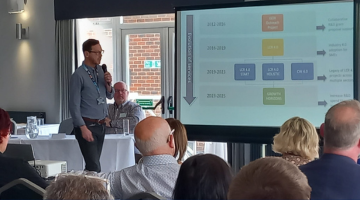About this course
LJMU's Civil Engineering MSc provides a route to Chartered Engineer status. You will learn the skills required to excel in and lead a civil engineering team.
- Study on a course informed by internationally recognised research from our Built Environment and Sustainable Technologies (BEST) Research Institute
- Enjoy excellent career opportunities in design and site-based roles
- Meet the requirements for Chartered Engineer status
Civil Engineering is a popular branch of engineering relating to the design and construction of large structures, such as bridges, roads, tunnels, tall buildings and flood defences. The overall aim of this programme is to produce Chartered Engineers who play a significant role in society as professional civil engineers. LJMU supports its students in developing the necessary skills to take on future leadership roles. The programme builds on foundational engineering knowledge and skills with a stimulating and challenging postgraduate programme of study that will advance your understanding and analytical skills. You will develop a critical awareness of current issues in the field, as developed by ongoing research from LJMU's Built Environment and Sustainable Technologies (BEST) Research Institute.
You will also evaluate the latest research and design methodologies, increase your understanding of ethical issues related to civil engineering, and your responsibilities with regards to sustainable construction.
In addition, you will develop a greater understanding of management principles and management strategies and be able to critically evaluate design, construction and operation within the context of both regulation and current developments.
Course modules
Discover the building blocks of your programme
Further guidance on modules
Modules are designated core or optional in accordance with professional body requirements, as applicable, and LJMU’s Academic Framework Regulations. Whilst you are required to study core modules, optional modules provide you with an element of choice. Their availability may vary and will be subject to meeting minimum student numbers.
Where changes to modules are necessary these will be communicated as appropriate.
Core modules
Research Project
60 credits
60 credits
This module will develop and test your ability to prepare a dissertation based on a study in appropriate depth, of a subject of some significance in relation to your own discipline within the built environment.
Research Methodology
10 credits
10 credits
This module will provide you with an understanding of the academic research process understanding the differing techniques, strategies and methods used to undertake research in the built environment.
Advanced Materials
10 credits
10 credits
This module will develop your understanding of the behaviour of Civil Engineering Materials under a wide range of service conditions. This will improve your ability to evaluate new developments in Materials Technology and to compare critically the choice of materials for specific applications.
Sustainable Infrastructure
20 credits
20 credits
This module will help you develop an understanding of the operation, design and management of infrastructure in both the Developing World and the Developed World. From this you will develop the capability for critical assessment of the sustainability of infrastructure in a wide variety of situations.
Energy and Carbon Management
20 credits
20 credits
This module develops students' ability to undertake a comprehensive review of energy supply, use and efficiency measures, in order to make informed decisions on energy use in the construction industry and business.
Applied Finite Element Analysis
20 credits
20 credits
The module will introduce you to the finite element method and you will explore the underlying theory of finite element methods. You will investigate the performance and reliability of finite element methods in civil engineering applications, such as structural problems including material nonlinearity. The theoretical aspects of the method will be covered in lectures - the module is intended to be practical in nature so that you have the opportunity to practice via a range of tutorials and assignments using commercial finite element software.
Advanced Structural Design and Bridge Engineering
20 credits
20 credits
This module expands student knowledge from the design of relatively small structures to the design of large structures such as large span roof trusses, cable bridge structures, composite, reinforced and prestressed concrete bridge decks. Students will develop critical understanding of the philosophies of current Codes of Practice and in using appropriate methods for the design of steel, composite, prestressed concrete, tensile cables and bridge elements/deck structures.
Collaborative BIM Project
20 credits
20 credits
The module is an opportunity for students to follow BIM protocols and practice in a collaborative multidisciplinary project team to achieve project success.
Professional accreditation/links
The accrediting body for this degree is the Joint Board of Moderators for the Institution of Civil Engineers, Institution of Structural Engineers, Institute of Highway Engineers, and the Chartered Institution of Highways and Transportation. Visit our website for further information.
This degree is accredited as fully satisfying the educational base for a Chartered Engineer (CEng). Visit our website for further information.
Ultimately, with relevant work experience and a masters-level degree, the degree can lead to the professional qualification of Chartered Engineer (CEng) and the equivalent European Qualification of EurIng.
This programme is also accredited by IStructE.

Your Learning Experience
An insight into teaching on your course
Teaching methods
You will learn through lectures, seminars and problem solving sessions.
Applied learning
You will develop a critical awareness of current issues in the field, as informed by ongoing research from LJMU's Built Environment and Sustainable Technologies (BEST) Research Institute. You will also benefit from site visits to see theory put into practice.
How learning is monitored on your programme
To cater for the wide-ranging content of our courses and the varied learning preferences of our students, we offer a range of assessment methods on each programme.
Where you will study
What you can expect from your School
The Department of Civil Engineering is situated in the Byrom Street complex of LJMU 's City Campus. Here you'll find high quality lecture theatres, meeting and seminar rooms plus social spaces and a large café. The Avril Robarts Library is just minutes away on Tithebarn Street.
Course tutors

Dr Ed Loffill
- Programme Leader
Ed's teaching role is in the civil engineering suite of programs where he mainly teaches soil mechanics, geotechnics and project modules on HNC and undergraduate programs along with environmental subjects on the Water, Energy and the Environment MSc program.His PhD research was a collaboration between industrial partners (Hydro International Plc and United Utilities Plc) focussed on assessment and improvement of a tertiary wastewater filtration process. This project involved combining the findings from laboratory (university based) and practical based fieldwork (United Utilities field site) into a numerical dataset from which he developed a predictive mathematical model of efficiency for the process. The research led to a number of publications and speaking at a number of conferences and is ongoing, with Ed supervising several PhD students.
-
 Lecturer/Senior Lecturer
Lecturer/Senior Lecturer
Career paths
Further your career prospects
LJMU has an excellent employability record with 96% (HESA 2018) of our postgraduates in work or further study six months after graduation. Our applied learning techniques and strong industry connections ensure our students are fully prepared for the workplace on graduation and understand how to apply their knowledge in a real world context.
Common roles for graduates of this programme include: Civil Engineers, Geotechnical Engineers, Project Engineers and Structural Engineers at organisations including Carillion, Arup, Tony Gee, Mouchel, Mott McDonald, J N Bentley Ltd, HL Structural Engineers, URS Infrastructure and Environment Atkin Global and as General Consultants.
Fees and funding
Tuition Fees:
- Home full-time per year:
- £9,920
Fees
The fees quoted at the top of this page cover registration, tuition, supervision, assessment and examinations as well as:
- library membership with access to printed, multimedia and digital resources
- access to programme-appropriate software
- library and student IT support
- free on-campus wifi via eduroam
Additional costs
Although not all of the following are compulsory/relevant, you should keep in mind the costs of:
- accommodation and living expenditure
- books (should you wish to have your own copies)
- printing, photocopying and stationery
- PC/laptop (should you prefer to purchase your own for independent study and online learning activities)
- mobile phone/tablet (to access online services)
- field trips (travel and activity costs)
- placements (travel expenses and living costs)
- student visas (international students only)
- study abroad opportunities (travel costs, accommodation, visas and immunisations)
- academic conferences (travel costs)
- professional-body membership
- graduation (gown hire etc)
Funding
There are many ways to fund postgraduate study for home and international students. From loans to International Scholarships and subject-specific funding, you’ll find all of the information you need on our specialist postgraduate funding pages.
Please be aware that the UK’s departure from the EU may affect your tuition fees. Learn more about your fee status and which tuition fees are relevant to you.
- International full-time per year:
- £18,250
International Scholarships and payment plans
Liverpool John Moores University is committed to supporting international students by providing a range of scholarships and flexible payment plans to help students manage their tuition fees.
Scholarships
LJMU provides a variety of scholarships to support international students. Scholarships are available to self-funded students who have accepted their offer and met all the conditions outlined in their offer letter. Students must also demonstrate that they can cover living costs, travel, and other expenses associated to studying at the university. Postgraduate scholarships include tuition fee reductions and are often offered in partnership with external funding organisations.
All self-funded international students are eligible for an automatic scholarship worth up to £4,000. For more details and to view our full list of scholarships, visit the international scholarship webpages.
Deposit
All students must pay a £5,000 deposit before they can receive their CAS letter.
For more information view our deposit page.
Tuition Fee Payment Plan
After paying their £5,000 deposit, students have the option to pay their fees in full or in three equal instalments minus any internal scholarships and discounts. There are two payment options available for international students. You can either pay your tuition fees in full before enrolment or opt for a payment plan. With the payment plan, you can pay your fees in three instalments after making your £5,000 deposit. The first instalment is due before enrolment.
All payments should be made through Flywire. Full details can be found in the How to Pay Guide.
Early Bird Tuition Fee discount
We are excited to introduce a £500 Early Payment Discount to all self-funded international students. Eligible self-funded students who pay their fees by the required deadlines will get a discount which will be automatically deducted from the 1st year of tuition fees.
To see the required deadlines please visit the webpage
Entry requirements
You will need:
Qualification requirements
Undergraduate degree
-
a minimum 2:2 in civil, structural or another type of engineering
or
-
considerable relevant work experience
Further information
- Extra Requirements
-
RPL
- RPL is accepted on this programme
International requirements
IELTS
- IELTS English language requirement: 6.5 (minimum 5.5 in each component)
How to apply
Securing your place at LJMU
To apply for this programme, you are required to complete an LJMU online application form. You will need to provide details of previous qualifications and a personal statement outlining why you wish to study this programme.
Your university life
From accommodation and academic support to clubs and societies. Find out what LJMU has to offer.
Talk to our students
Connect with a current LJMU student for advice and guidance on university life, courses and more.
See what our students are saying
At LJMU we want you to know you’re making the right choice by studying with us. You can see what our students are saying about their experience with us through their reviews on the following websites:
Related Links
News and views
Browse through the latest news and stories from the university










The University reserves the right to withdraw or make alterations to a course and facilities if necessary; this may be because such changes are deemed to be beneficial to students, are minor in nature and unlikely to impact negatively upon students or become necessary due to circumstances beyond the control of the University. Where this does happen, the University operates a policy of consultation, advice and support to all enrolled students affected by the proposed change to their course or module.










